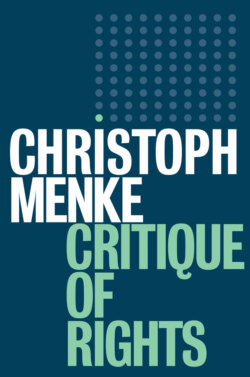Читать книгу Critique of Rights - Christoph Menke - Страница 7
ОглавлениеPart I History: The Legalization of the Natural
Here we find ourselves in the “Copernican” moment of the history of the science of law, at the boundary between two worlds. A new social order is born, whose nucleus will become an individual right that is developed entirely from the concept of potestas, elevated to the dignity of a right.1
Modern legal theory and philosophy of law were the first to speak of rights that belong to the individual and which the individual can exercise for his or her own ends. For this reason, rights here are also first characterized as a person’s property, endowment, or capacity. It is only at this point that talk of “subjective” or “individual” rights could flourish. At the same time, rights are an essential way of formally defining private or civil law. Rights are primarily defined as claims that enable one person to impose an obligation on another person. The form of rights is therefore as old as the institution of civil law: they have existed ever since there were contractually regulated exchange relations. Both of these observations must be borne in mind at the same time. Together, they define the historicity of rights: rights are a form that can only be understood in historical terms.
We are concerned with the modern form of rights. This modern form cannot be understood by merely considering the continual formulations expressed by civil law regarding the normativity of exchange relationships that, beyond mere family arrangements, pervade all societies: the modern form of rights alters social exchange relationships so fundamentally that no concept of their normative regulation – obligation, freedom, equality, authority [Herrschaft] – is able to retain its traditional meaning. Nor can the modern form of rights be understood by attempting to derive it directly from the basic concept of modernity’s normative order, from the concept of the self-determining, autonomous subject: the modern form of rights does not exist because there are autonomous subjects, but autonomous subjects exist because the modern form of rights does. The modern form of rights results from a radical transformation of law. This transformation is radical because it concerns the meaning of law. With the modern form of rights, the concept of law, indeed the concept of normativity, acquires a new, fundamentally different meaning. The transformation in the conception of rights, which were traditionally expressed in terms of private law, thus does not remain restricted to this domain: “law” as such thereby comes to mean something else, and hence rights in their modern form only exist beyond private law.
A radical transformation of law takes place in the modern form of rights. The de-moralization [Entsittlichung] of law expresses this in negative terms: traditionally, law is the moral or rational order of the fair share in which each receives his or her own – his or her right. The modern administration of rights, however, must be defined in positive terms. It consists in the reconfiguration of the basic relation between the legal and the pre- or extra-legal, between norm and nature. In the modern form of rights, law becomes the process of juridification: rights are the mechanisms of an incessant legalization of the natural.
Notes
1 1. Michel Villey, La formation de la pensée juridique moderne, ed. by Stéphane Rials (Paris: Quadrige/PUF, 2006), 267.
